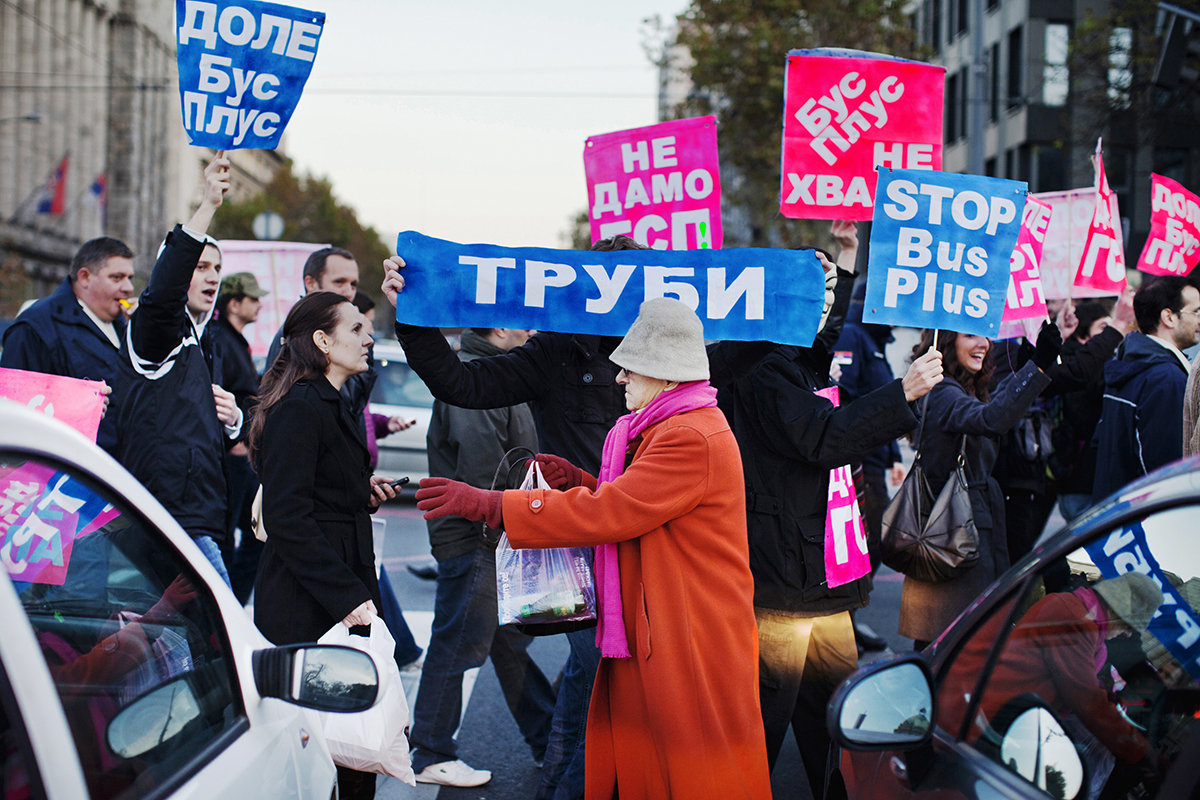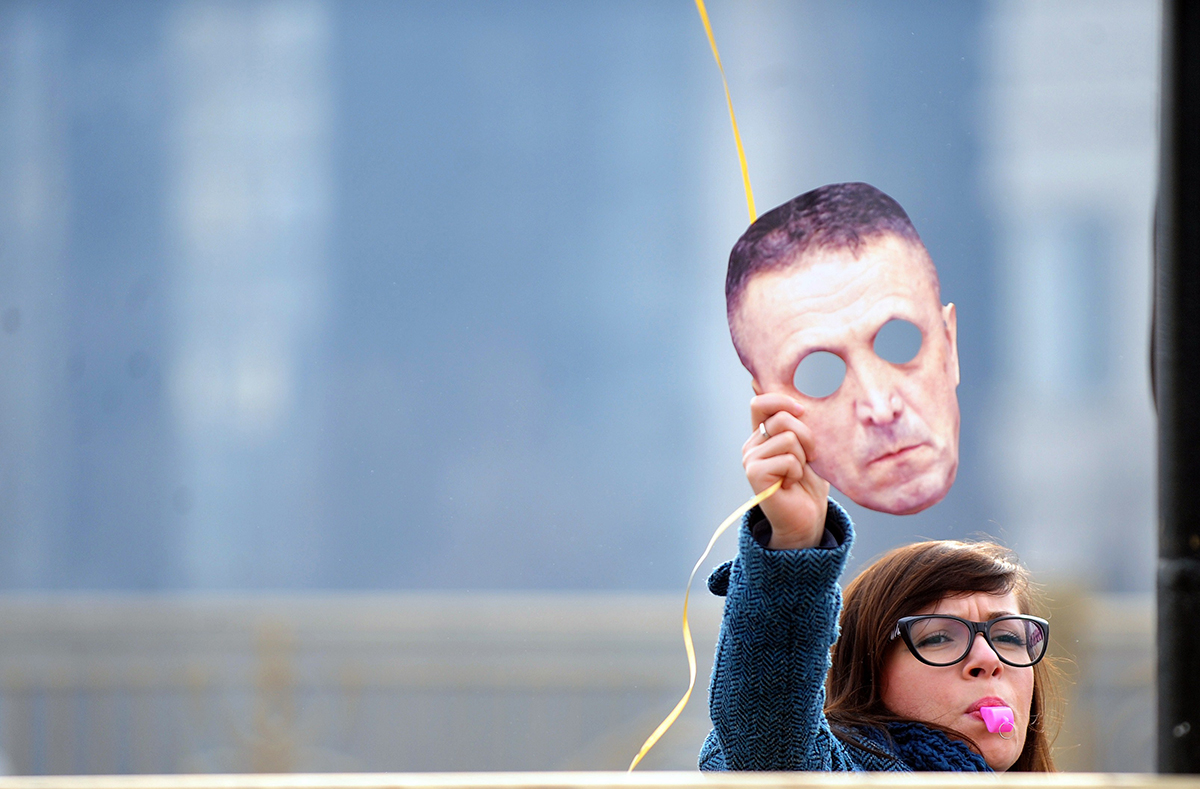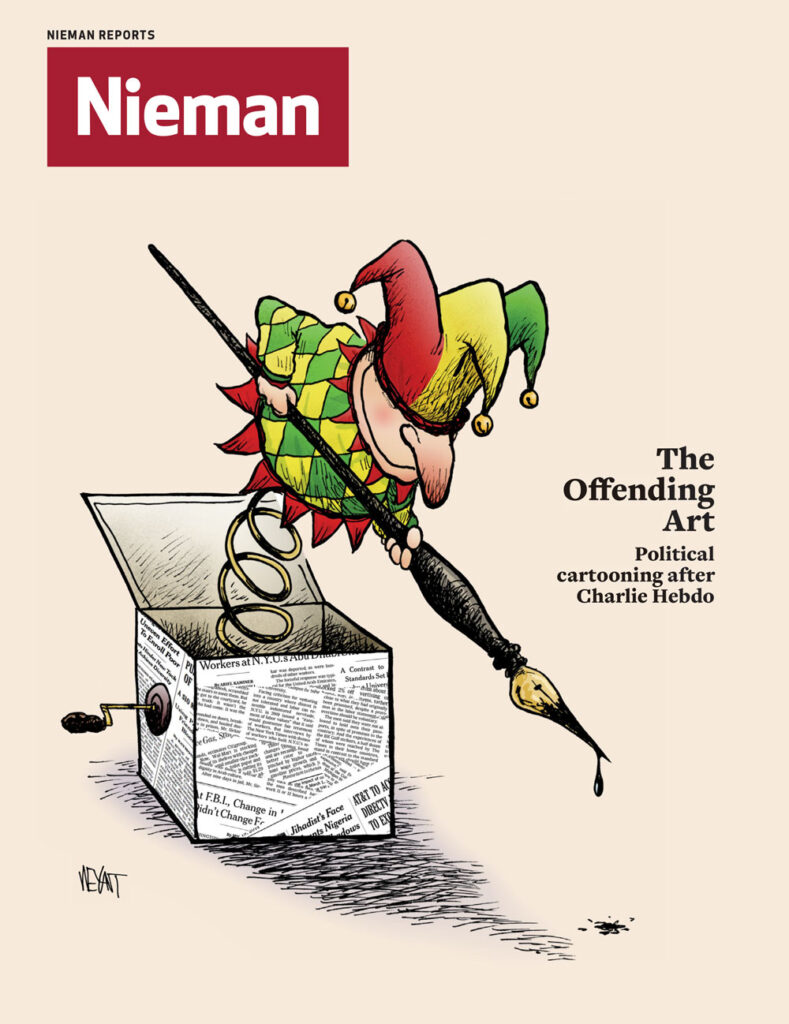In August 2012, Jelena Krstović was one of the most influential people in Serbia. At just 30, she was a vice president of the country’s biggest privately owned company, Delta Holding. Miroslav Mišković, the sole owner of Delta, is one of the wealthiest people in Central and Eastern Europe, having made his fortune in retail, insurance and food production. In 2007, Forbes magazine estimated Mišković’s net worth at $1 billion.
On August 29, 2012, Krstović tweeted an Instagram photo of herself on a private jet, a Louis Vuitton notebook on her knees. “Working in the air” was her caption for the photo. The picture itself would not have been interesting—just another of Serbia’s nouveau riche bragging about their wealth—had it not been for the notes. A closer examination of the scribbling revealed that Press, a pro-government tabloid that was one of the biggest dailies in Belgrade, was co-owned by Mišković and that the other owner was the mayor of Belgrade, Dragan Djilas. Before the unintended publication of this information in the tweet, the public had been in the dark as to who owned Press. The owners had been hidden behind offshore companies in Cyprus and a couple of lawyers in Serbia.
Pištaljka (“The Whistle”), an investigative journalism website I co-founded, published a story about the tweet hours after it had been posted. What followed is typical of the Serbian media scene, and of the Balkans in general. Krstović deleted the tweet half an hour after our story ran, later claiming that the tweet had been “manipulated and photoshopped.” Only one other media outlet, a small bi-weekly magazine called Svedok (“The Witness”), reprinted the story. Everyone else remained silent. Djilas, in addition to being mayor of Belgrade, was also co-owner of Serbia’s biggest advertising and media buying agency.
Three months later, in November 2012, the tabloid Kurir ("Courier") published a front page story featuring the tweet. The story appeared a month before Mišković was arrested on unrelated charges of corruption. At the time, the government was trying to replace Djilas as mayor. (He was forced out a year later.) Mišković admitted he had a stake in Press, and the newspaper folded a few days after this announcement. Djilas has never publicly commented on his relationship to Press. Jelena Krstović has not represented the company in public for the past two and a half years and has largely avoided Twitter. Her LinkedIn profile states she is no longer vice president of Delta Holding.
Opaque funding, hidden ownership, murky ties among politicians, big business, and journalists—these problems are all too common in the countries that once made up Yugoslavia. Fourteen years after the last of the Balkan wars ended, the region has made limited economic and political progress compared to other countries in Eastern Europe. Slovenia and Croatia have joined the European Union, while the rest (Bosnia and Herzegovina, Macedonia, Montenegro, Serbia, and Kosovo, a province that seceded from Serbia in 2008 and is recognized by a slim majority of U.N. members but not by Serbia) are at different stages of negotiations to enter the bloc.
In Croatia and Bosnia, independent news portals are among the most visited sites
Despite the proclaimed goal of pan-European integration and the fact that most people speak variants of the same language, Balkan countries remain economically and politically fragmented. Unemployment is high in nearly all the Balkan nations, with Macedonia’s rate at 29%, according to the International Labour Organization. In such circumstances, it is difficult to sustain independent media outlets and easy for political or business forces to suppress critical coverage. An annual report conducted by the Journalists’ Association of Serbia (UNS) recently found that 40% of journalists surveyed occasionally face censorship, a drop from 46% in 2012, but that as many as 48% believe other journalists self-censor their articles. There are, however, signs of hope as investigative reporting moves online. In Croatia and Bosnia, news portals not linked to big business or politicians are even among the most visited sites, ranking only behind giants like Facebook, Google, and YouTube.

In November of last year, the Sarajevo-based Klix, the most visited news site in Bosnia, published an audio recording of Željka Cvijanović, prime minister of Republika Srpska, the Serb entity in Bosnia and Herzegovina, discussing “buying” two opposition MPs to support the government. Instead of investigating the Prime Minister and MPs on possible corruption charges, police searched the offices of Klix and left with reporters’ cell phones, hard drives, CDs, and flash drives. Prosecutors said the police were ordered to find out who was “eavesdropping” on the Prime Minister. The police search of Klix’s offices led to a series of protests by journalists in Bosnia, uniting reporters across ethnic lines. “It is only by solidarity that we can prevent further erosion of media freedom,” says Siniša Vukelić, a Serb journalist.
In a market as fragmented as that of the former Yugoslavia, however, it is almost impossible to sustain an independent media company. Whereas in the past a newspaper could easily have a circulation of several hundred thousand copies, best-selling dailies in Serbia and Croatia sell just over 100,000 copies now.
And there is always the issue of revenue. In Serbia, the total advertising market fell from a peak of $260 million in 2008 to about $200 million in 2013. This led to virtually all media looking for funding from governments, which, in turn, opened the door to censorship, self-censorship and the gradual disappearance of investigative reporting from the mainstream media. According to a recent report called “Soft Censorship: Strangling Serbia’s Media” by the World Association of Newspapers (WAN-IFRA), “there are no consolidated data about state funds participating in the media market. Unofficial estimations of media organizations vary from 15% to even 40%.”
The economic crisis “sucked the air out of the debates on press freedom,” says Ljiljana Smajlović, president of the UNS and editor-in-chief of Politika, a conservative daily, considered Serbia’s newspaper of record. “Economic survival has become the motto. Everyone fears lay-offs. Journalists have been pauperized over the years. Few feel secure in their jobs, while the odds of finding another journalism job, should they lose the present one, are very small.” In the past six years, a ‘pay to play’ model has developed in the region, whereby media outlets receive government grants, ads from government-controlled agencies, and direct funding in return for positive coverage and/or lack of critical reporting.
Take the daily Nezavisne Novine (“Independent Newspaper”). Željko Kopanja started the paper in Banja Luka, capital of the Serb part of Bosnia, after the Bosnian war ended in 1995 with money from the U.S. and other Western governments. In 1999, after publishing a series of stories on war crimes by Serbs in Bosnia, he had both his legs blown off in an assassination attempt. He returned to work soon after, turning Nezavisne into the biggest media company in Republika Srpska. But lack of advertising revenue led Kopanja to turn to the Bosnian Serb government for assistance.
According to data published by the Bosnian Center for Investigative Reporting (CIN), Nezavisne Novine received more than $400,000 from the Bosnian Serb government in 2011 for four projects, which included distribution of the daily in Serbia, opening an office in Washington, and conducting two polls, one on the public perception of the government and the other on starting a business in the Republika Srpska. Nezavisne Novine has not investigated the growing business empire of Republika Srpska President Milorad Dodik, though it has carried out other investigations, including one on some 5,000 cell phone numbers that had been illegally tapped by the Bosnian security and intelligence services.
Foreign publishers also carry out government-funded projects. Ringier Axel Springer, a joint venture between the Swiss publisher Ringier and the German powerhouse Axel Springer, publishes the Blic ("Flash") and Alo ("Hello") tabloids and the 24 Sata ("24 Hours") free newspaper in Belgrade. The company received more than $600,000 in 2010 and 2011 from the Serbian government to perform environmental research. State auditors could not find evidence of any research performed by Ringier Axel Springer, while Blic daily published a number of articles presenting Environment Minister Oliver Dulić in a favorable light. Blic did not report that Dulić was selling computer equipment to as many as 70 agencies controlled by the government and had authorized payments of $33,000 for developing a simple website and $670,000 for advertisements during the Serbian Open tennis tournament in 2009 and 2010. These stories about Dulić were published online by nonprofit organizations, including Pištaljka.
The online migration of investigative reporting is not limited to Serbia. In Croatia, sites like H-alter and the ironically named Cenzura Plus (“Censorship Plus”) are run as nonprofits and, like their Serbian counterparts, rely heavily on funding from Western governments and charities, public funds not under political control, and donations from readers. Cenzura Plus, run almost exclusively by women, produces a weekly TV program shown on several local stations and engages in civic activism. H-alter, a left-wing portal, publishes comments and investigations critical of the pervasive role of the Catholic Church and nationalism in Croatia.
In neighboring Slovenia, the wealthiest of the former Yugoslav republics, the government has “indirect, but noticeable” influence on the media, according to veteran reporter Igor Mekina. “The three big dailies—Večer, Delo and Dnevnik—all owe money to banks controlled by the government. There are independent outlets, like the left-wing Mladina (“Youth”) and the right-wing Reporter weeklies, but their influence is limited,” says Mekina, who was foreign editor of Dnevnik until 2008.
“Only those media close to governments, tycoons or criminals can survive,” says Senad Pećanin, founder and former editor-in-chief of Dani (“Days”), an independent weekly based in Sarajevo, Bosnia. “Journalism in the countries of the former Yugoslavia survived decades of communist dictatorship, years of wars in the 1990s, but not this market totalitarianism.” Pećanin had to sell Dani in 2010 due to lack of funds. He is now a practicing lawyer.
Some journalists have found other ways to make money, serving as advisors to politicians, spokespersons for government agencies, or editors of official websites. Sometimes they continue reporting, despite the conflict of interest. For example, Danijel Apostolović, from 2007 to 2012 was a journalist at the Serbian public service TV, RTS, and the media advisor to Mirko Cvetković, who has served as prime minister and finance minister. He has since left journalism.
“It has become normal that a politician or a tycoon tells a journalist what to report on,” says Igor Gajić, former editor-in-chief and general manager of Reporter weekly, which folded three years ago. Gajić now works as advisor in the government of Republika Srpska. Gajić says he is disillusioned after getting Reporter through 15 turbulent years: “I and my colleagues tried hard to raise the level of professionalism and dignity of journalism in Bosnia, but we failed. The more we insisted on being true to journalism, the weirder we looked to just about everyone else. No one writes for readers or viewers anymore, but exclusively for financiers.”
Predrag Radonjić, deputy editor in chief of Serbian-language non-profit KIM Radio in Kosovo disagrees. “We are mostly financed by international organizations, and this is the backbone of our freedom,” he says. KIM Radio has not only managed to operate for 15 years in a small Serbian enclave near Priština, the capital of Kosovo, which is largely Albanian, but has grown to be a respected source of information not only for local Serbs, but also for Albanian journalists.

In neighboring Macedonia, which also is split along ethnic lines, Almakos, a small Albanian-language website, has also become a credible source of information. Covering news from Albania, Macedonia, and Kosovo, the site draws readers from both from the region and the diaspora. According to Web analytics company Alexa, about a third of visitors to Almakos come from Switzerland, which has a sizeable population of Albanian immigrants. This helps the site attract ads unconnected to local tycoons or the government.
Journalists across nations are overcoming their differences to fight for press freedom
Almakos is part of a new generation of Balkan media, developing business models that make them independent of governments and big business and establishing credibility across ethnic divisions. Still, old animosities remain. Most ethnic Macedonian journalists “fight for the Macedonian cause,” says Almakos general manager Semi Mehmeti, and most ethnic Albanian journalists “fight for the Albanian cause.” This was on display in the spring of 2012 during ethnic riots in the country, when most Albanian-language media blamed Macedonians and most Macedonian-language media blamed Albanians. The coverage prompted the Association of Journalists of Macedonia, an inter-ethnic organization, to appeal to fellow reporters to stop producing articles that “contribute to fueling passions and inter-ethnic tensions.”
Macedonia’s ranking in the annual Press Freedom Index that Reporters Without Borders compiles has dropped precipitously, from 34 in 2009 to 117 in 2015. In explaining the drop, the organization cited the ongoing case against investigative reporter Tomislav Kežarovski. In October 2013, Kežarovski was sentenced to four and a half years in prison (reduced to two years on appeal in January 2015) for publishing, in a 2008 article, the name of a protected witness in a murder investigation. Kežarovski had quoted a leaked police report that included the name of the witness, who had not been given protection at the time and later said that he gave a false confession under police pressure.
The month before his arrest, Kežarovski had published an article raising questions about the police investigation into a car crash that killed Nikola Mladenov, owner of the independent weekly Fokus ("Focus"). Mladenov’s newspaper was one of the last print outlets critical of the Macedonian government, according to the Committee to Protect Journalists. Tamara Chausidis, president of the Union of Macedonian Journalists, argues that article was the real reason for Kežarovski’s sentence, which she called a “chilling message to the few remaining investigative reporters in Macedonia.”
There are a few legacy titles managing to survive after years of turmoil, including the progressive Koha Ditore (“Daily Times”) in Kosovo, which began publishing in 1997 as the first independent Albanian-language daily in the former Yugoslav countries. A 2010 study by the Organization for Security and Co-operation in Europe showed, however, that most government-controlled advertising goes to other dailies, usually connected to ruling parties. Koha’s editor in chief Agron Bajrami says that journalism in Kosovo is “under siege” and he’s pessimistic about the future. “The economic situation in Kosovo is pathetic, and the pressure from the government is growing by the day,” he says. “I am not certain we will be able to withstand much longer.”
Fear of losing their jobs is an important reason journalists in mainstream media stay away from sensitive subjects. (I and a group of my colleagues were fired from Politika in 2009, after we published articles critical of Serbia’s foreign policy and the pervasive graft in the government.) But having lost their jobs—or being unable to secure jobs at legacy titles in the first place—many journalists have gone on to found the online outlets that are keeping investigative reporting alive in the Balkans.
In Serbia, my publication, Pištaljka, as well as Južne vesti (“Southern News”) and the Center for Investigative Reporting have welcomed journalists who used to work for mainstream outlets. In Slovenia, a group of young journalists launched the nonprofit Pod črto (“Bottom Line”) to investigate graft and corruption; its business model is based on donations from readers. In Croatia, Vjetrenjača (“The Windmill”) uses a similar business model to fund data journalism on topics like public procurement and government spending.
Pištaljka, launched in 2010, relies on tips from the public. On average, we receive about 100 tips per month, about 10% of which are extremely well documented. Once we investigate the tips and publish stories, the mainstream media tends to reprint them, which brings the issues to a wider public—and, in many cases, there are consequences for politicians. Our experience so far proves that there is a motivated audience interested in investigative reporting. It is this audience that Balkan journalists must continue to engage and develop.




